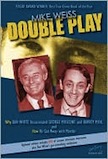 Double Play: The Hidden Passions behind the Double Assassination of George Moscone and Harvey Milk
Double Play: The Hidden Passions behind the Double Assassination of George Moscone and Harvey Milk
by Mike Weiss
Vince Emery Productions
496 pages, $39.95
THE NAME most closely associated with the modern gay movement in the U.S. is Harvey Milk. He was the first openly gay man elected to a prominent political office, that of San Francisco city supervisor. Although he represented a single city district, Milk knew he was living at a significant moment in gay history. During his campaign, he insisted that voters confront the fundamentalist threat of Anita Bryant in faraway Dade County, Florida. After his election, he worked tirelessly to defeat the Briggs Initiative that would have banned gay men and lesbians from working in California public schools. Milk was a charismatic orator, an engaging, imperfect, but fundamentally decent human being who was killed just as he was poised to become a national leader. His story inspired Randy Shilts’ book The Mayor of Castro Street, the film documentary The Times of Harvey Milk, an opera called Harvey Milk, and the 2008 movie Milk.






